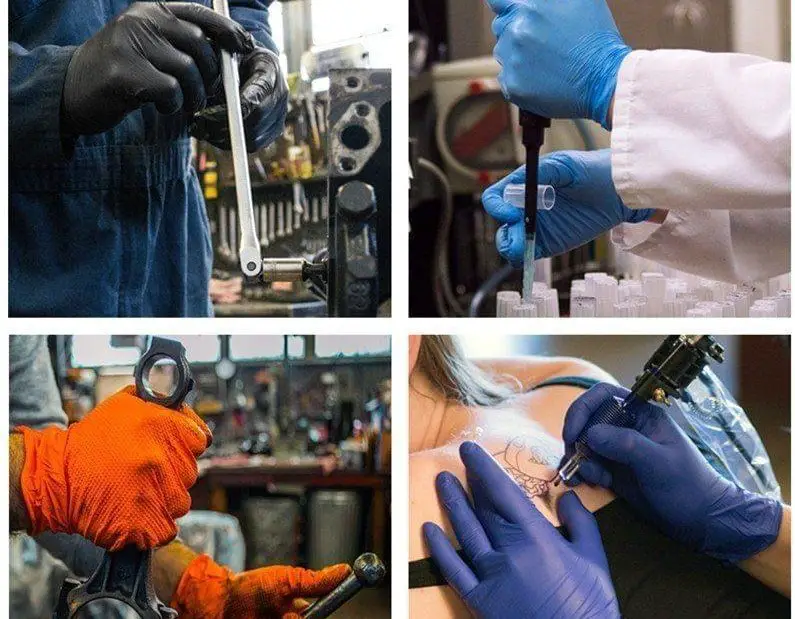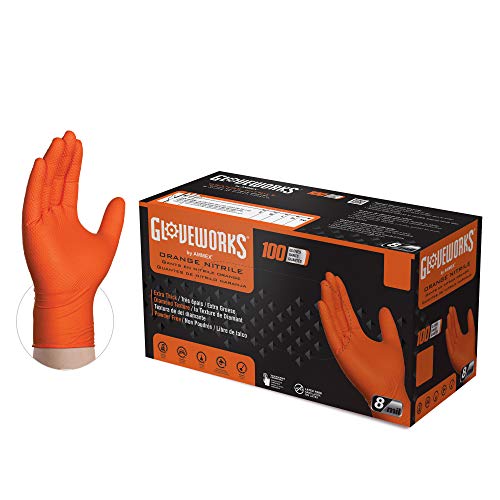No matter whether you work in a factory or a food processing unit or handles chemicals, keeping your hands safe, soft and comfortable is a necessity.
If you have ever searched for good work gloves you must have come across nitrile gloves. But do you know why they are special? Or do you know how they differ from regular latex gloves?
Well let’s dive into the A to Z details about nitrile work gloves without further ado.

What are nitrile work gloves used for?
Nitrile gloves are affordable, effective, disposable gloves used extensively by laborers across multiple industries and sectors.
Nitrile gloves are synthetic and latex free. Short for acrylonitrile-butadiene rubber, nitrile is made from acrylonitrile and butadiene.
NBR or nitrile rubber is sold under trade names such as Perbunan, Nipol, Krynac and Europrene. From the nuclear industry to food processing industry, workers have tried, tested and have bestowed their trust upon these work gloves.
Versatile and resistant to almost every substance out there, nitrile gloves are well suited for all types of laborers.
Pros and cons of nitrile work gloves
Pros:
1.) NBR has high stability at extremely low and extremely high temperatures. Therefore they are apt for handling hot and cold substances.
2.) Resistant to oil, fuel and other chemicals.
3.) The material is very strong and resistant to wear and tear.
4.) Puncture-proof
5.) Nitrile rubber are powder free and therefore do not cause allergies like latex, hence it a better alternative for people who are sensitive to allergens.
6.) Nitrile gloves have a chlorinated finish that help in donning them even when the wearer has got wet hands.
7.) Flexible and hence can be used in situations that warrant dexterity and sensitivity.
8.) Has low level of friction and can therefore be worn for longer durations.
9.) Man-made and therefore is cheaper than latex.
10.) Has a longer shelf life and has lower chance of wastage when compared to other types of disposable gloves.
11.) Has micro textured feature for slip resistance.
11.) Available in a wide variety of colours,thicknesses, sizes and textures.
Cons:
1.) Nitrile gloves have less tactile sensitivity than latex gloves.
2.) They cost more than vinyl gloves.
3.) Certain types of nitrile gloves have been found to have cytotoxins and harmful chemicals that can cause allergies. If you are hypersensitive towards chemicals, nitrile gloves can cause skin rashes or contact dermatitis.
4.) Nitrile gloves should not be used while dealing with aromatic solvents, ketones and acetates.
Who all can use nitrile work gloves?
Due to its resistance towards almost all sorts of substances, it’s toughness and durability, nitrile gloves are used by almost all types of workers from almost every industry. Nitrile gloves are commonly used by:
-
-
- Aerospace
- Chemical manufacturing
- Dentistry and hygiene
- Food processing
- Engineering
- Electronics
- Healthcare
- Laboratory work
- Printing
- Manufacturing and assembly
- Pharmaceutical
-
What are nitrile gloves not suitable for?
Even though nitrile gloves provide great protection from almost all sorts of substances, they do tend to give in to extremely toxic and hazardous materials.
Toxic substances can permeate the gloves and cause skin damage and health issues. When dealing with the following types of hazardous materials, it is not applicable to use nitrile gloves:
-
-
- Aromatic solvents
- Ketones
- Acetates
- Concentrated acids
- Highly corrosive chemicals
-
Instead of nitrile gloves you can opt for butyl, norfoil, neoprene or viton gloves instead.
Industrial grade vs Medical grade nitrile gloves
When you choose a nitrile work glove, it is important to know how suitable they are for your workplace requirements. The most common differentiation among nitrile work gloves is the one between industrial grade and medical grade nitrile gloves.
Industrial grade nitrile gloves are best fitted for handling harsh chemicals and solvents. Some common industries that use nitrile gloves can include automotive, janitorial and tattoo shops.
Medical grade nitrile gloves are preferred when you have to deal with pathogens and environmental contaminants at your workplace. This type of nitrile glove is most often found in hospitals, medical facilities, dental facilities and other laboratories.
Medical grade nitrile gloves are FDA tested for durability and strength and are only made available in the market if they have FDA approval.
How long does nitrile work gloves last?
Nitrile gloves are disposable gloves and are meant for a single usage. You can reuse them a couple of times if needed if you are not dealing with medical or hazardous materials.
Nitrile gloves have a long shelf life and if the package is sealed and left intact, nitrile gloves can last up to five years. They are strong, sturdy and resistant to almost all substances and this add to their impressive durability.
Even though nitrile gloves can last a long time, it is always best to check the expiry date on the packet before you put them on. Nitrile gloves should be stored in cool and dark places if you want them to have a longer shelf life.
See also: How Long Does It Take for Nitrile Gloves to Decompose?
Can nitrile work gloves be washed?
When used in hazardous conditions as a disposable PPE, nitrile gloves should not be reused under any circumstances. In such situations nitrile gloves are not deemed to be suitable for washing, decontamination or reprocessing procedures.
Well if you are not using them as a disposable PPE you may wash nitrile gloves in mild laundry soap or detergent at the sink. Bleach or solvents should be avoided to prevent discoloration and the gloves ought to be air dried to prevent shrinkage.
Will sanitizer damage nitrile gloves?
In this pandemic era, we are often compelled to use sanitizer all the time and many of you might be wondering if sanitizer will damage nitrile gloves.
Porosity and structure of natural latex can be damaged by sanitizers but nitrile is extremely resistant to alcohol and other chemicals and therefore would not be affected by sanitizers.
Nitrile work gloves vs Later work gloves vs Vinyl work gloves
| Nitrile gloves | Latex gloves | Vinyl gloves |
| Does not cause allergies | Causes allergies | Does not cause allergies |
| Cheaper | Cheap | Cheapest |
| Extremely durable | Durable | Less durable |
| Good protection | Good protection | Moderate protection |
| Not touch sensitive | Touch sensitive | Touch sensitive |
| Can be used to handle hazardous materials | Can be used to handle hazardous materials | Not fit to handle hazardous materials |
| Good resistance to chemicals and toxins | Moderate resistance to chemicals | Little to no resistance to chemicals |
Top 3 nitrile work gloves
1.) MedPride Powder-Free Nitrile Exam Gloves
This extremely durable, affordable and ambidextrous glove is a must have for medical professionals. It is easy to use, provides great comfort and protection and has great functionality as well.
- The ideal solution for individuals sensitive to natural rubber latex and donning powder.
- Comfortable fit with textured fingertips for excellent tactile sensitivity.
- Extraordinary strength, stretchable durability and puncture resistance with premium iris blue color.
- Commonly used by law enforcement professionals, tattoo artists, physicians and first responders.
Prices pulled from the Amazon Product Advertising API on:
Product prices and availability are accurate as of the date/time indicated and are subject to change. Any price and availability information displayed on [relevant Amazon Site(s), as applicable] at the time of purchase will apply to the purchase of this product.
2.) Venom Chemical-Resistant Disposable Nitrile Gloves
This sturdy and durable glove is a perfect fit for anyone who is looking for an affordable, medium duty glove.
- Disposable nitrile gloves have provide better protection for mediumduty tasks
- Made from latexfree nitrile rubber, powder free
- Great for painting, cleaning, and automotive work
- Fits either hand, fully textured for a better grip
Prices pulled from the Amazon Product Advertising API on:
Product prices and availability are accurate as of the date/time indicated and are subject to change. Any price and availability information displayed on [relevant Amazon Site(s), as applicable] at the time of purchase will apply to the purchase of this product.
3.) GLOVEWORKS HD Orange Nitrile Disposable Gloves
With excellent elasticity and unparalleled comfort levels, this food safe glove is an essential for anyone working in the kitchen or food processing industry.
- Industrial-grade nitrile gloves offer excellent elasticity, puncture resistance, and chemical resistance. Nitrile delivers a comfort level rivaling that of latex.
- Disposable gloves in high-visibility orange improve safety. They are a great fit for automotive, industrial, and food handling applications.
- Latex-free disposable gloves are ideal for those allergic to natural rubber latex.
- With the added texture, this glove runs small, consider ordering a size larger than usu
Prices pulled from the Amazon Product Advertising API on:
Product prices and availability are accurate as of the date/time indicated and are subject to change. Any price and availability information displayed on [relevant Amazon Site(s), as applicable] at the time of purchase will apply to the purchase of this product.










